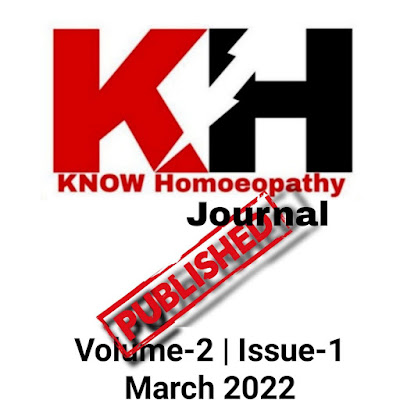KNOW Homoeopathy Journal
E-ISSN: 2583-2158
Bi-Annual, Indexed, Double Blind, Peer-Reviewed, Research Scholarly Online Journal in Field of Homoeopathy
KNOW Homoeopathy Journal
Vol–2 & Issue-1, 15 March 2022, Published at https://www.knowhomoeopathyjournal.com/2022/03/volume-2-issue-1.html, Pages: 82 to 86, Title: : Role of
homeopathy in treatment of renal calculi , Authored By: Dr Shreshtha
Saraswat (PGR, Department of Practice of Medicine, Tantia University, Rajasthan)
Title: Role of
Homoeopathy in Treatment of Renal Calculi
Authored By:- Dr Shreshtha
Saraswat
PGR, Department of Practice
of Medicine,
Cite this Article as:
Dr. Shreshtha Saraswat, Role of homeopathy in treatment of renal calculi, Vol.2 & Issue 1, KNOW Homoeopathy Journal, Pages 82 to 86 ( 15 March 2022), available at https://www.knowhomoeopathyjournal.com/2022/03/role-of-homoeopathy-in-treatment-of-renal-calculi.html
CLICK HERE TO SEE - PUBLISHER DETAILS
CLICK HERE TO READ - COPYRIGHT POLICY
CLICK HERE TO READ - DISCLAIMER
Abstract–
Renal stone ( Nephrolithiasis ) are a condition in which one and more stone present in the pelvis or calyces of the kidney or in the ureter.
Keywords-
Renal stone , renal calculi , nephrolithiasis
Introduction-
Renal calculi is a condition in which one and more stone present in the pelvis or calcyes of the kidney or in the ureter.
It is estimated that approximately 12 % of the population will have renal stone . In u.s and other developed country kidney stone are more common in men then women .
Calcium salts , uric acid ,,cysteine and struvite ( MgNh4PO4) are the basic constituent of most kidney stones .
In homeopathy we don’t treat the disease but the disease man . It is a holistic system of medicine . Homeopathy believe in concept of vital force which when become derangedthrough disharmonies living and thinking manifestation of symptoms take place .
Aetiology–
Environment and dietary cause – low urine volume ,high ambient temperature , low fluid intake diet – high protein , high sodium ,low calcium.
- High sodium excretion
- High oxalate excretion
- High urate excretion
- Low citrate excretion
Acquired cause – hypercalcemia ,renal tubular acidosis
Congenital and inherited cause – family hypercalcemia , medullary sponge kidney ,cystinuria ,renal tubular acidosis , hyoeroxaluria.
Types / composition of renal stones-
1. Calcium salts
2. Uric acid
3. Cysteine
4. Struvite
5. Calcium oxalate and calcium phosphate
Clinical features-
Pain ,haematuria, urinary tract infection, acute loin pain radiate to abdominal wall ,pain with vomiting , sweating ,pallor
Investigations-
Urine analysis, blood tests , abdominal USG , X- ray of KUB region
Homeopathic treatment-
1. Berberis vulgaris– Pain in small of the back , very -sensitive to touch in renal region< while sitting and lying from jar from fatigue .Burning and soreness in region of kidney .Numbness , stiffness, lameness with painfull pressure in renal and lumbar region. Stitching , cutting pain from left kidney following cause of ureter into bladder and urethra .renal colic <left side . Bubbling sensation of kidneys. urine greenish , blood red with thick slimy mucus , transparent , reddish or jelly like sediment .Burning pain , sensation as if some urine remaining after urinating Pain in thighs and loins on urinating.
2. Lycopodium- Red sand in urine , child cries before urinating , pain in back relieved by urinating , renal colic right side . Pain in back after urinating ceases after flow ,slow in coming must strain .Polyuria during night .
3. Occimum can. –Uric acid diathesis, red sand in urine it’s chief characteristics , right side renal colic . highly acidity formation of spike crystals of uric acid .turbid ,thick , purulent,bloody,brick dust red or yellow sediment pain in ureter , cramps in kidney .
4. Sarsaparilla– Severe almost unbearable pain T conclusion of urination .passage of gravel or small calculi ,renal calculi stone in bladder ,bloody urine .urine bright and clear but irritating scanty ,slimy ,falky, copious, passed without sensation , deposit white sand
5. Equisetum- Severe dull pain and feeling of fullness in the bladder ,not releivedby urinating.Irritation in bladder specially in women . excessive burning in urethra while urinating. Pain in bladder as from distension .enuresis ,loss of control over bladder .great desire to urinate but only small quantity passes .obliged to rise several time at night to urinate .
6. Pareirabrava – Black , bloody , thick mucous in urine , constant urging , great straining , pain down to thighs during efforts to urinate , can emit urine only when he goes on his knees , pressing head firmly against the floor , feeling of bladder being distended and neurglic pain in the anterior crural region . Dribbling after micuration, voilent pain in glans penis .
7. Cantharis – Constant urging to urinate , passing but a few drops at a time which is mixed with blood . Intolrable urging before and during micuration . Voilent pain in bladder . burning , cutting pain in urethra during micurationvoilenttenesmus and strangury .
8. Nux vomica– Irritable bladder ,from spasmodic sphincter , haematuria , ineffectual urging , spasmodic and strangury . Renal colic extending to genitals , with Dribbling urine . While urinating , itching in urethra and pain in neck of bladder .
9. Hydrangea– Burning in urethra and frequent desire . Urine hard to start .heavy deposit of muscus sharp pain in loins especially left .great thrist, with abdominal symptoms and enlarge prostate , profuse deposit of white amorphous salts.
Bibliography
- Davidson
‘s principal and practice of medicine -23 rd edition
- Harrison
‘s principal of internal medicine (vol 1)
- Boericke
new manual of Homoeopathic materiaMedica and repertory
- Allen
‘s key notes rearranged & classified with leading remedies of MateriaMedica& bowel nosodes.




